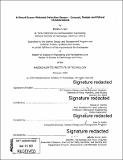| dc.contributor.advisor | Sanjay E. Sarma. | |
| dc.contributor.author | Sen, Pankhuri. | en_US |
| dc.contributor.other | Massachusetts Institute of Technology. Engineering Systems Division. | en_US |
| dc.contributor.other | System Design and Management Program. | en_US |
| dc.contributor.other | Massachusetts Institute of Technology. Institute for Data, Systems, and Society. | en_US |
| dc.contributor.other | Technology and Policy Program. | en_US |
| dc.date.accessioned | 2022-08-31T16:29:34Z | |
| dc.date.available | 2022-08-31T16:29:34Z | |
| dc.date.copyright | 2020 | en_US |
| dc.date.issued | 2020 | en_US |
| dc.identifier.uri | https://hdl.handle.net/1721.1/145236 | |
| dc.description | Thesis: S.M. in Engineering and Management, Massachusetts Institute of Technology, Engineering Systems Division, System Design and Management Program, 2020 | en_US |
| dc.description | Thesis: S.M. in Technology and Policy, Massachusetts Institute of Technology, School of Engineering, Institute for Data, Systems, and Society, Technology and Policy Program, 2021 | en_US |
| dc.description | Cataloged from PDF version of thesis. | en_US |
| dc.description | Includes bibliographical references (pages 85-90). | en_US |
| dc.description.abstract | Human waste contained in diapers is a rich source of medical health based data. Embedding low-cost, wearable sensors in disposable diapers provides an opportunity for self-health monitoring and advancing preventative medicine. Diaper users include infants, elderly, disabled individuals, and hospital patients. Diaper wetness-based alerting can enhance care of this population by improving incontinence management, preventing rashes and infections, and avoiding embarrassment. A practical implementation of this consumer-oriented system will directly impact the user, their habits, ecosystem around the user, enhance access to health based information and disrupt the existing business models. Integrating ethical dimensions of privacy, safety, security, sustainability and socio-economic implications is essential to responsible technology development. | en_US |
| dc.description.abstract | In this thesis, we realize a novel sensor for moisture detection leveraging the material properties of the water absorbing polymer gel common to most disposable diapers. The proposed UHF RFID based sensor utilizes hydrogel for moisture sensing and as antenna element, thus creating a hybrid design uniquely composed of metal and hydrogel. The design optimized for smallest baby diaper geometry achieves a 1-meter read range, a bend radius of <20mm, is insensitive to sensor orientation relative to the reader, is low-cost, and can be integrated with existing diaper manufacturing units. An outlook on health applications enabled by a powerful diaper sensing system establishes the need for grounding future research with ethical considerations. We present a condensed narrative on understanding ethics, applied ethics, interplay of technology and society, the role of creators to subsequently detail the ethical considerations pertaining to development of IoT products and services. A method to administer the ethical considerations is extended and exemplified through our work on diaper moisture sensor. | en_US |
| dc.description.statementofresponsibility | by Pankhuri Sen. | en_US |
| dc.format.extent | 90 pages | en_US |
| dc.language.iso | eng | en_US |
| dc.publisher | Massachusetts Institute of Technology | en_US |
| dc.rights | MIT theses may be protected by copyright. Please reuse MIT thesis content according to the MIT Libraries Permissions Policy, which is available through the URL provided. | en_US |
| dc.rights.uri | http://dspace.mit.edu/handle/1721.1/7582 | en_US |
| dc.subject | Engineering Systems Division. | en_US |
| dc.subject | System Design and Management Program. | en_US |
| dc.subject | Institute for Data, Systems, and Society. | en_US |
| dc.subject | Technology and Policy Program. | en_US |
| dc.title | A smart diaper wetness detection sensor : concept, design and ethical considerations | en_US |
| dc.type | Thesis | en_US |
| dc.description.degree | S.M. in Engineering and Management | en_US |
| dc.description.degree | S.M. in Technology and Policy | en_US |
| dc.contributor.department | Massachusetts Institute of Technology. Engineering Systems Division | en_US |
| dc.contributor.department | System Design and Management Program. | en_US |
| dc.contributor.department | Massachusetts Institute of Technology. Institute for Data, Systems, and Society | en_US |
| dc.contributor.department | Technology and Policy Program | en_US |
| dc.identifier.oclc | 1342000085 | en_US |
| dc.description.collection | S.M. in Engineering and Management Massachusetts Institute of Technology, Engineering Systems Division, System Design and Management Program | en_US |
| dc.description.collection | S.M. in Technology and Policy Massachusetts Institute of Technology, School of Engineering, Institute for Data, Systems, and Society, Technology and Policy Program | en_US |
| dspace.imported | 2022-08-31T16:29:34Z | en_US |
| mit.thesis.degree | Master | en_US |
| mit.thesis.department | Sloan | en_US |
| mit.thesis.department | TPP | en_US |
